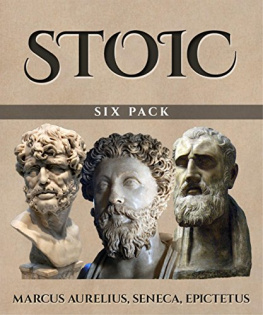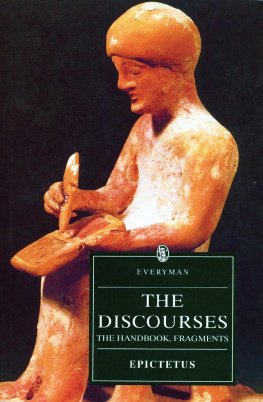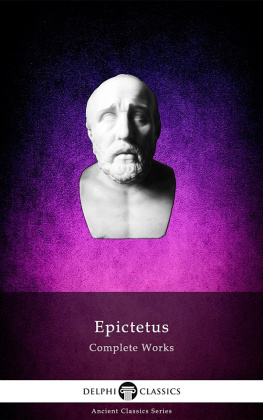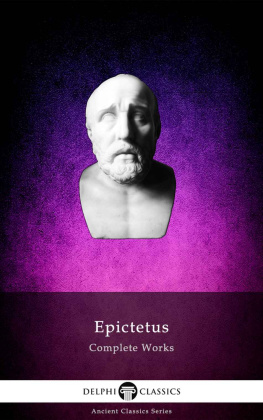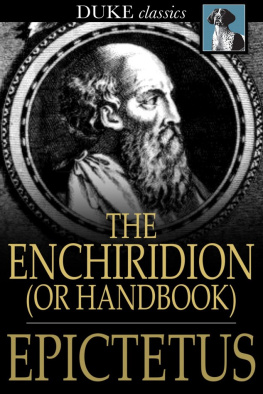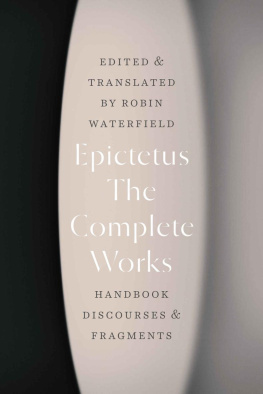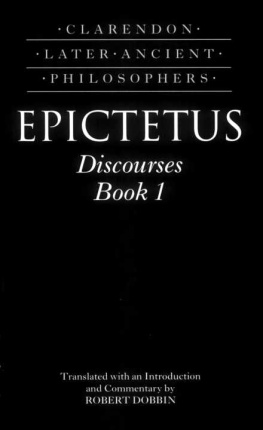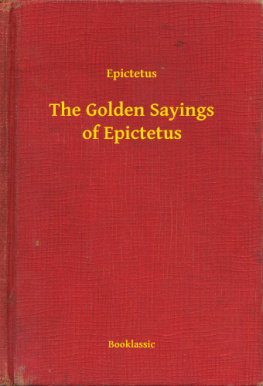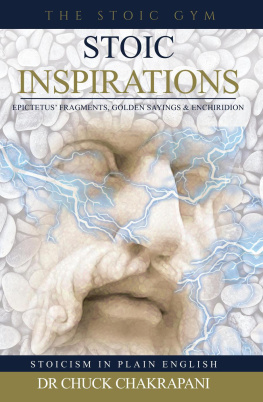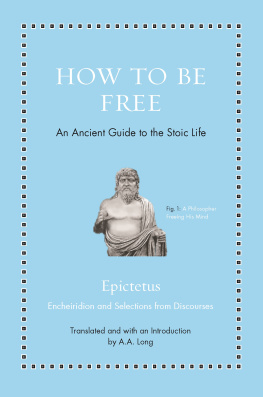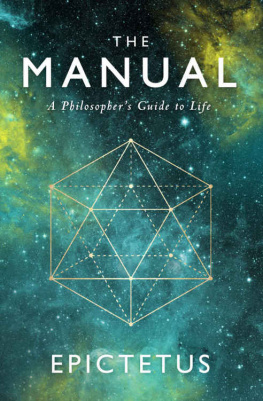Epictetus - Discourses and Selected Writings
Here you can read online Epictetus - Discourses and Selected Writings full text of the book (entire story) in english for free. Download pdf and epub, get meaning, cover and reviews about this ebook. year: 2008, publisher: Penguin Classics, genre: Religion. Description of the work, (preface) as well as reviews are available. Best literature library LitArk.com created for fans of good reading and offers a wide selection of genres:
Romance novel
Science fiction
Adventure
Detective
Science
History
Home and family
Prose
Art
Politics
Computer
Non-fiction
Religion
Business
Children
Humor
Choose a favorite category and find really read worthwhile books. Enjoy immersion in the world of imagination, feel the emotions of the characters or learn something new for yourself, make an fascinating discovery.
- Book:Discourses and Selected Writings
- Author:
- Publisher:Penguin Classics
- Genre:
- Year:2008
- Rating:3 / 5
- Favourites:Add to favourites
- Your mark:
- 60
- 1
- 2
- 3
- 4
- 5
Discourses and Selected Writings: summary, description and annotation
We offer to read an annotation, description, summary or preface (depends on what the author of the book "Discourses and Selected Writings" wrote himself). If you haven't found the necessary information about the book — write in the comments, we will try to find it.
DESPITE BEING BORN into slavery, Greco-Roman philosopher Epictetus became one of the most influential thinkers of his time. Discourses and Selected Writings is a transcribed collection of informal lectures given by the philosopher around AD 108. A gateway into the life and mind of a great intellectual, it is also an important example of the usage of Koine or ?common? Greek, an ancestor to Standard Modern Greek.
Discourses and Selected Writings — read online for free the complete book (whole text) full work
Below is the text of the book, divided by pages. System saving the place of the last page read, allows you to conveniently read the book "Discourses and Selected Writings" online for free, without having to search again every time where you left off. Put a bookmark, and you can go to the page where you finished reading at any time.
Font size:
Interval:
Bookmark:
PENGUIN  CLASSICS
CLASSICS
EPICTETUS ( c. AD 55-135) was a teacher and Graeco-Roman philosopher. Originally a slave from Hierapolis in Anatolia (modern Turkey), he was owned for a time by a prominent freedman at the court of the emperor Nero. After gaining his freedom he moved to Nicopolis on the Adriatic coast of Greece and opened a school of philosophy there. His informal lectures (the Discourses ) were transcribed and published by his student Arrian, who also composed a digest of Epictetus teaching known as the Manual (or Enchiridion). Late in life Epictetus retired from teaching, adopted an orphan child and lived out his remaining years in domestic obscurity. His thought owes most to Stoicism, but also reflects the influence of other philosophers, Plato and Socrates in particular. His influence has been deep and enduring, from Marcus Aurelius in his Meditations to the contemporary psychologist Albert Ellis, who has acknowledged his debt to Epictetus in devising the school of Rational-Emotive Behavioural Therapy.
ROBERT DOBBIN was born in New York City in 1958. He received a Ph.D. in Classics from the University of California at Berkeley in 1989, and taught history and classics at the college level for years. He is the author of Epictetus Discourses: Book One (Oxford, 1998), as well as articles on Virgil, Plato and Pythagoras. Currently he works as a book editor in northern California.
Selected Writings
Translated and edited by
ROBERT DOBBIN
PENGUIN BOOKS
PENGUIN CLASSICS
Published by the Penguin Group
Penguin Books Ltd, 80 Strand, London WC2R 0RL , England
Penguin Group (USA) Inc., 375 Hudson Street, New York, New York 10014, USA
Penguin Group (Canada), 90 Eglinton Avenue East, Suite 700, Toronto, Ontario, Canada M4P 2Y3
(a division of Pearson Penguin Canada Inc.)
Penguin Ireland, 25 St Stephens Green, Dublin 2, Ireland (a division of Penguin Books Ltd)
Penguin Group (Australia), 250 Camberwell Road, Camberwell, Victoria 3124, Australia
(a division of Pearson Australia Group Pty Ltd)
Penguin Books India Pvt Ltd, 11 Community Centre, Panchsheel Park, New Delhi 110 017, India
Penguin Group (NZ), 67 Apollo Drive, Rosedale, North Shore 0632, New Zealand
(a division of Pearson New Zealand Ltd)
Penguin Books (South Africa) (Pty) Ltd, 24 Sturdee Avenue, Rosebank, Johannesburg 2196, South Africa
Penguin Books Ltd, Registered Offices: 80 Strand, London WC2R 0RL , England
This translation first published in Penguin Classics 2008
1
Translation and editorial material copyright Robert Dobbin, 2008
All rights reserved
The moral right of the translator and editor has been asserted
Except in the United States of America, this book is sold subject to the condition that it shall not, by way of trade or otherwise, be lent, re-sold, hired out, or otherwise circulated without the publishers prior consent in any form of binding or cover other than that in which it is published and without a similar condition including this condition being imposed on the subsequent purchaser
ISBN: 9781101488201
978-0-14-191748-1 978-0-14-191748-1
At the beginning of the second century ad, in the reign of the emperor Trajan, a group of young men could be found studying philosophy at a boarding school in Nicopolis, a Roman colony in Epirus (north-west Greece). They were students of Epictetus. In a prefatory letter one such pupil, Arrian by name ( c. AD 86-160), takes credit for committing a sizeable number of Epictetus lessons to print, thereby ensuring their survival. These are the Discourses. Arrian is also credited with preparing a digest of his masters thought: the Manual or (in Greek) Enchiridion. A modest number of fragments attributed to Epictetus have also come down to us (some of them derived from Discourses otherwise lost, as only four books of the eight that Arrian originally published are extant).
Besides being an uncommonly diligent stenographer, Arrian was an author in his own right, best known for his biography of Alexander the Great. He was also a man of the world, a Roman consul and later legate to the Roman province of Cappadocia. Taking into account his own literary aspirations, and the formidable challenge posed by transcribing Epictetus lectures live, i.e. as they were being delivered, some have questioned whether his opening letter is completely trustworthy in characterizing the collection as nothing less than a verbatim record of what the philosopher said, inside and outside the classroom. Most students of the Discourses incline to the view that, in the process of effecting the transition of Epictetus lectures to print, Arrian probably permitted himself a few editorial changes. Establishing the dramatic context of the Discourses, in imitation of Platos Socratic dialogues, may be one of his contributions. But any alterations or improvements he made to the text are unlikely to have been extensive. The books of history and geography that Arrian wrote later are so unlike the Discourses in style and content that, even if we did not have his word for it, we would be unlikely to conclude that they were products of the same hand. Arrian published his edition of the Discourses soon after Epictetus died, and an unauthorized edition had already been in circulation; so other of Epictetus students were in a position to judge how faithful Arrian was to the actual words of the master; and we have no record of anyone impugning their essential honesty. On the contrary, Arrians collection was accepted immediately as an authentic and definitive record of Epictetus thought, and even though Arrian was responsible for actually writing the book, Epictetus is conventionally, and rightly, treated as their author. Even if we cannot be sure that Epictetus actually said everything attributed to him in the Discourses , or in those exact words, we have no reason to doubt that the bulk of the material does derive from what Arrian and others heard while seated at the masters feet.
Details of Epictetus life are sketchy; the Discourses themselves are our richest source of information. We can only make an educated guess as to the year he was born and the year he died, but are not likely to be far wrong in giving his dates as c. AD 55135. We know that he was born into slavery because he tells us so, and from an ancient inscription we learn that his mother had been a slave. The place of his birth was Hierapolis, a major Graeco-Roman city in what today is south-western Turkey. The native language there was Greek the Koine or common Greek that derived from the language of classical Athens, but became widely disseminated in a simplified form during the Hellenistic era. The Discourses are a principal source for our knowledge of Koine Greek (as is the Greek New Testament, to cite another example).
More than once Epictetus refers to himself as a lame old man, but nowhere elaborates on the cause of his disability. Two traditions independent of the Discourses give competing accounts. Early Christian authors report that a sadistic master was responsible for rendering him crippled for life. But others interpret lame old man as almost a pleonastic phrase, which is to say that he may have suffered from rheumatism or arthritis as a natural consequence of advancing age. The latter explanation is in fact the more likely. We know who his owner was; his name was Epaphroditus, and Epictetus makes mention of him several times, not exactly in complimentary terms, but not with any hint of bitterness either. Epaphroditus is famous for more than just being Epictetus master. A former slave himself, after manumission he rose to the position of Neros secretary in charge of petitions; later he would serve Domitian in the same capacity. Descriptions of life at court frequently appear in the Discourses, in terms detailed and vivid enough to suggest that his service to Epaphroditus acquainted Epictetus at first hand with the manners, routines and attitudes of the emperor and his courtiers. We can go further and speculate that in this equivocal position a slave on the one hand, but also a privileged member of the emperors inner circle Epictetus came to appreciate in full the ambiguities of power, and learned to distinguish real freedom from counterfeit. This dialectic of freedom and slavery colours much of his presentation of Stoic thought.
Next pageFont size:
Interval:
Bookmark:
Similar books «Discourses and Selected Writings»
Look at similar books to Discourses and Selected Writings. We have selected literature similar in name and meaning in the hope of providing readers with more options to find new, interesting, not yet read works.
Discussion, reviews of the book Discourses and Selected Writings and just readers' own opinions. Leave your comments, write what you think about the work, its meaning or the main characters. Specify what exactly you liked and what you didn't like, and why you think so.


